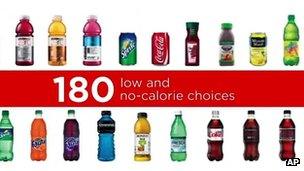Coca-Cola addresses obesity in TV advert
- Published
- comments

Fizzy drink makers have come under pressure from critics who say sugary drinks help cause obesity
Fizzy-drink giant Coca-Cola has launched an advert addressing obesity for the first time on television.
The two-minute commercial highlights the firm's record of making low-calorie drinks and reminds viewers all foods contain calories.
The ad, which aired on US cable networks on Monday, follows mounting pressure on the soft drinks industry.
New York City is preparing to ban large sugary drinks in restaurants, cinemas and stadiums.
Coca-Cola has said the video was not made in response to criticism of the soft drink industry, but is an effort to raise awareness.
It is not the first time the Atlanta-based firm has used advertising to address this issue, but it is a first for television.
'Damage control'
"There's an important conversation going on about obesity out there, and we want to be a part of the conversation," Stuart Kronauge, general manager of sparkling beverages for Coca-Cola North America, told the Associated Press.
In the advert, a female narrator says Coca-Cola offers smaller portion sizes, is working to make better-tasting, low-calorie sweeteners and has voluntarily made lower-calorie drinks available at schools.
The video adds: "All calories count, no matter where they come from."
It says: "If you eat and drink more calories than you burn off, you'll gain weight."
Another ad, which will air later this week, features activities that add up to burning off the "140 happy calories" in a can of Coke.
But Mike Jacobson, executive director for the Center for Science in the Public Interest, said that if the company was serious about tackling obesity it would stop fighting a tax on its drinks.
"It looks like a page out of Damage Control 101," he said. "They're trying to disarm the public."
Industry tracker Beverage Digest has reported that consumption of fizzy drinks in the US has been declining steadily since 1998.